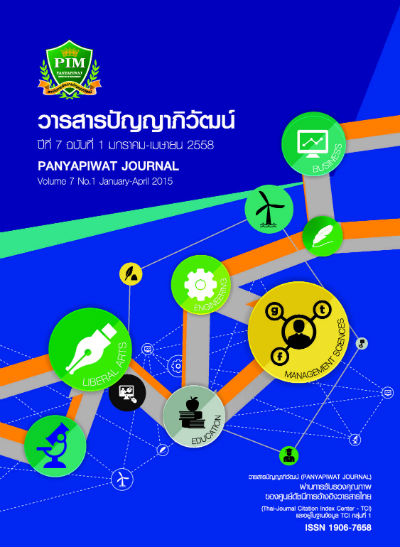ESSENTIAL ELEMENTS OF AN INTEGRATED MANAGEMENT MODEL FOR DAY SPAS IN THAILAND
Main Article Content
บทคัดย่อ
Article Details
“ข้าพเจ้าและผู้เขียนร่วม (ถ้ามี) ขอรับรองว่า บทความที่เสนอมานี้ยังไม่เคยได้รับการตีพิมพ์และไม่ได้อยู่ระหว่างกระบวนการพิจารณาลงตีพิมพ์ในวารสารหรือแหล่งเผยแพร่อื่นใด ข้าพเจ้าและผู้เขียนร่วมยอมรับหลักเกณฑ์การพิจารณาต้นฉบับ ทั้งยินยอมให้กองบรรณาธิการมีสิทธิ์พิจารณาและตรวจแก้ต้นฉบับได้ตามที่เห็นสมควร พร้อมนี้ขอมอบลิขสิทธิ์บทความที่ได้รับการตีพิมพ์ให้แก่สถาบันการจัดการปัญญาภิวัฒน์หากมีการฟ้องร้องเรื่องการละเมิดลิขสิทธิ์เกี่ยวกับภาพ กราฟ ข้อความส่วนใดส่วนหนึ่งและ/หรือข้อคิดเห็นที่ปรากฏในบทความข้าพเจ้าและผู้เขียนร่วมยินยอมรับผิดชอบแต่เพียงฝ่ายเดียว”
เอกสารอ้างอิง
Bateman, T. S. & Snell, S. A. (2007). Management: Leading & Collaborating in a Competitive World. 7thed. New York: McGraw- Hill.
Baxter, L. A. & Babbie, E. (2004). The Basics of Communication Research. California: Thomson.
Berry, L. M. (2003). Employee Selection. California: Wadsworth.
Boehnke, K., Lietz, P., Schreier, M., Wilhem, A. A., Matsumoto, D., Van D. V. & Fons, J. R. (2011). Sampling: The Selection of Cases for Culturally Comparative Psychological Research. Cross-Cultural Research Methods in Psychology, 75-100.
Chain Conveyor Design. (2011). Porter’s Value Chain. Retrieved April 6, 2013, from http://www.chainconveyordesign.net/wp-content/uploads/2011/11/Porters-Value-Chain.jpg
Chase, R. B., Jacobs, F. R. & Aquilano, N. J. (2004). Operations Management for Competitive Advantage. Boston: McGraw- Hill.
Cohen, M. & Bodeker, G. (2008). Understanding the Global Spa Industry. Massachusetts: Elsevier.
Colquitt, J. A., Lepine, J. A. & Wesson, M. J. (2009). Organizational Behavior. Boston: McGraw- Hill.
Dalling. (2007). The intergrated management model. Oxford University.
Deenonpho, S. (2007). Purchase Decision for ‘A’ Thai Massage Shop in Mueng District, Chiang Mai Province. Retrieved January 30, 2013, from http://library.cmu.ac.th/faculty/econ/Exer751409/2550/Exer2550_84
Department of Health Service Support, Thailand. (2012). Criteria for the Certification of Health Spas. Retrieved January 5, 2013, from http://www.thaispaassociation.com/wp-content/uploads/2012/02/World-Class-by-MOPH.pdf
Department of Tourism. (2010). International Tourist Arrivals to Thailand. Retrieved June 15, 2014, from http://tourism.go.th/2010/th/statistic/tourism.php?cid=30
Fiscal Policy Research Institute Foundation. (2013). Looking at the Future Thailand’s and World’s Economy. Bangkok: Ministry of Treasury, Thailand.
Grondzik, W. T., Kwok, A. G., Stein, B. & Reynolds, J. S. (2010). Mechanical and Electrical Equipment for Buildings (11thed.). New Jersey: John Wiley & Sons.
Gummusson, E. (2008). Total Relationship Marketing. 3rd ed. Oxford: Butterworth- Heinemann.
Krajewski, J., Ritzman, B. & Malhotra, M. (2007). Operations Management. 8thed. New Jersey: Pearson.
Kvale, S. P., Rhodes, J. E. & Yardley, L. (2007). The Psychoanalytical Interview as Inspiration for Qualitative Research. Qualitative Research in Psychology, 275- 298.
Leedy, P. D. & Ormrod, J. E. (2005). Practical Research: Planning and Design. 8thed. New Jersey: Pearson.
Marczyk, G., De Matteo, D. & Festinger, D. (2005). Essentials of Research Design and Methodology. New Jersey: John Wiley & Sons.
McMullan, R. (2012). Environmental Science in Building. (7thed.). New York: Palgrave.
Ministry of Public Health, Thailand. (2011). Summary of Health Service Businesses Sorted by Province as of 2011. Bangkok: Ministry of Public Health.
Niles, Robert. (1995). Standard Deviation. Retrieved January 5, 2015, from http://www.robertniles.com/stats/stdev.shtml
Norasucha, V. (2007). Value chain management model for performance excellence of hotel spas in Bangkok. (Master’s thesis). Shinawatra University, Faculty of the Graduate School of Science in Management.
Page, S. J. & Dowling, R. K. (2002). Ecotourism. Harlow: Prentice-Hall.
Pelham, B. W. & Blanton, H. (2007). Conducting Research in Psychology. (3rd ed.). California: Thomson.
Phopruksanantha, N. (2008). Research Methodology. (5 th ed.). Bangkok: EXPERNET.
Ponpraw, S. (2008). Customer Satisfaction of Chattaya Clinic Thai Massage & Spa at Hua-Hin. Retrieved January 31, 2013, from http://thesis.swu.ac.th/swuthesis/Bus_Ed/Ponprawe_S.pdf
Stair, R. & Reynolds, G. (2010). Information Systems. (9th ed.). Canada: Cengage.
Starbuck, M. & Horne, L. (2012). Textile Product Development and Definition. New Product Development in Textiles, 30- 50.
Srisuwannakarn, S. (2013). Strategic Plan and Tactics to Promote Tourism. Bangkok: Department of Tourism.
Thaweerat, P. (1997). Behavioural and Social Research Methodology. (7th ed.). Bangkok: Chulalongkorn University Press.
Ussahawanitchakit, P. & Pongpearchan, P. (2010). Human Capital Orientation: Effects on Organizational Effectiveness and Firm Success of Spa Businesses in Thailand. Journal of International Business and Economics, (10), 85- 98.
Wetprasit, P. (2006). Impacts of Work-Related Determinants on Job Satisfaction and Retention Intentions in Thai Spa Industry. Oklahoma: The Graduate College of the Oklahoma State University.
Yamane, T. (1973). Statistic: An Introductory Analysis. (3rd ed.). Newyork: Harper and Row Publication.


